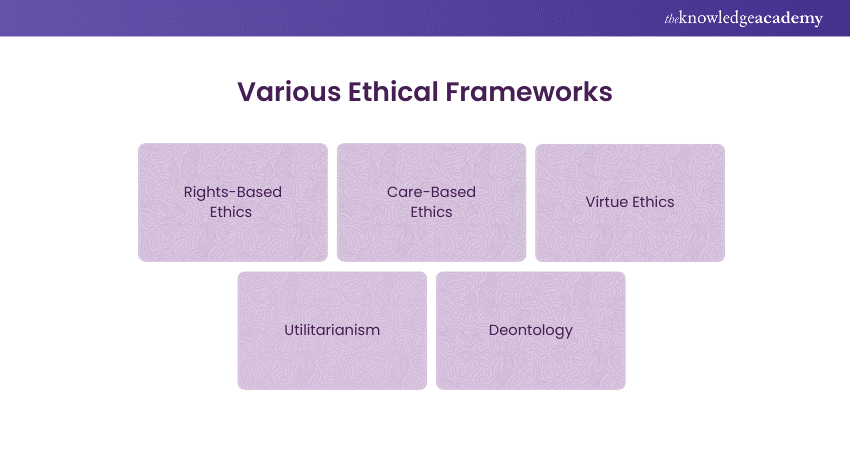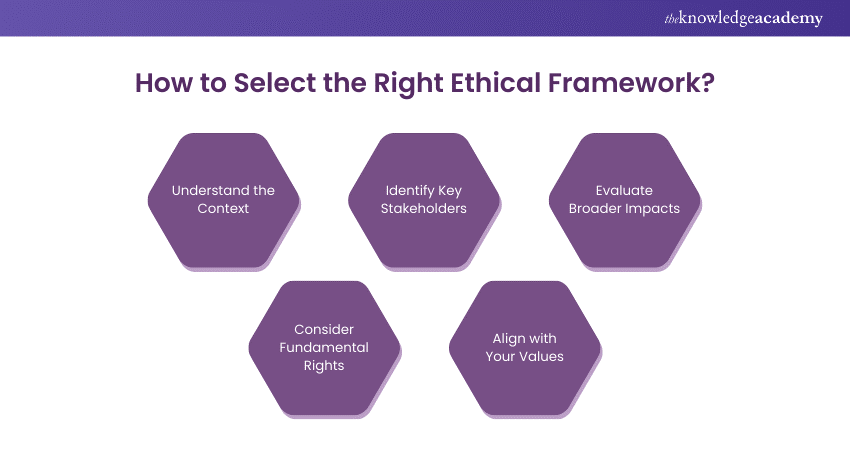We may not have the course you’re looking for. If you enquire or give us a call on +47 80010068 and speak to our training experts, we may still be able to help with your training requirements.
Training Outcomes Within Your Budget!
We ensure quality, budget-alignment, and timely delivery by our expert instructors.

Ethical dilemmas are an inevitable part of life, from personal decisions to business strategies. Navigating these complexities requires more than intuition—it demands a structured approach grounded in core moral principles. Enter Ethical Frameworks, the compass guiding individuals and organisations in choosing the right action.
This blog delves into Ethical Frameworks' essence, significance, and the various models you can consider when confronting moral decisions.
Table of Contents
1) What are Ethical Frameworks?
2) The Importance of Using an Ethical Framework
3) Exploring Various Ethical Frameworks
4) Selecting the Appropriate Ethical Framework for Your Needs
5) Conclusion
What are Ethical Frameworks?
Ethical Frameworks are systematic methods for assessing and resolving ethical dilemmas by applying moral principles. They provide a structured process for evaluating what is right or wrong in various contexts. By adopting a framework, individuals can approach ethical issues objectively, ensuring decisions are consistent and align with core values. They are crucial in law, healthcare, and corporate governance, where moral choices can significantly impact Stakeholders.
The Importance of Using an Ethical Framework
Using an ethical framework is critical for several reasons:
1) It offers clarity in Decision-Making by presenting a structured path to evaluate ethical concerns. This helps avoid hasty decisions driven by emotions or external pressures.
2) Ethical Frameworks foster consistency. When similar ethical issues arise, having a set method ensures responses remain coherent and justifiable.
30 Adopting a framework builds trust.
People are more likely to trust decisions based on transparent, well-reasoned processes, whether in a professional setting or in their personal lives.
Exploring Various Ethical Frameworks
Different Ethical Frameworks offer distinct lenses for analysing moral questions. Below, we explore some of the most influential models:

Rights-Based Ethics
Rights-based ethics centres around the belief that everyone possesses fundamental rights that should not be violated. These rights can be legal, human, or moral in nature. The focus is on respecting and protecting these rights in all decisions. For example, freedom of speech or the right to privacy are vital principles. In rights-based ethics, actions are evaluated based on whether they uphold or infringe upon individual rights.
Care-based Ethics
Care-based ethics, often associated with feminist ethics, emphasises interpersonal relationships and the significance of empathy in moral decision-making. It values the importance of context and relationships over universal rules.
This framework is especially relevant in scenarios requiring compassion, nurturing, and consideration for the unique needs of individuals, such as in healthcare or family dynamics. Instead of focusing purely on duty or rules, it prioritises maintaining healthy relationships and caring for others.
Virtue Ethics
Virtue ethics shifts the focus from actions to the character and virtues of the decision-maker. Rooted in Aristotle's philosophy, this framework argues that ethical behaviour stems from cultivating virtues like courage, honesty, and compassion. The idea is that individuals naturally make ethical choices by consistently practising virtuous behaviour.
Unlike rule-based models, virtue ethics emphasises moral character as the foundation for ethical decisions.
Strengthen workplace harmony with our Employee Relations Training. Join now!
Utilitarianism
Utilitarianism assesses actions based on their outcomes, aiming to maximise overall happiness or minimise suffering. The classic practical principle is “the greatest good for the greatest number.” This approach is often applied in public policy, business, and medicine, where decisions impact large groups.
However, utilitarianism also faces criticism for sometimes neglecting individual rights or justifying unethical means to achieve desirable outcomes.
Deontology
Deontology, associated with the philosopher Immanuel Kant, is a rule-based approach that focuses on duty and adherence to ethical principles. It argues that specific actions are inherently right or wrong, regardless of their consequences.
For example, lying is morally wrong, even if it could lead to a positive outcome. Deontologists believe in consistently upholding moral duties and principles, making this framework particularly relevant in fields like law and professional ethics.
Selecting the Appropriate Ethical Framework for Your Needs

Choosing the right ethical framework depends on the nature of the dilemma and the context in which it arises. For instance, a care-based approach may be more suitable in scenarios where relationships and compassion are essential. If the situation involves broader societal impacts, utilitarianism might offer better guidance.
A rights-based framework could be the most relevant when fundamental rights are at stake. Calculating the strengths and limitations of each model and aligning them with your values is essential for making ethical decisions that resonate with your personal or organisational goals.
Build effective policies that drive organisational success with our HR Policy Training. Sign up now!
Conclusion
Navigating ethical dilemmas requires more than intuition—it demands structured reasoning. Ethical Frameworks offer valuable tools to approach complex moral decisions thoughtfully and consistently. From rights-based principles to virtue ethics, these models provide various lenses to assess right and wrong. By aligning your values with an appropriate framework, you empower yourself to make decisions that are ethical and deeply aligned with your moral compass.
Enhance your decision-making with our Personal Ethics Training. Join now!
Frequently Asked Questions

Ethical Frameworks guide decision-making by offering structured approaches to evaluate moral dilemmas. They ensure decisions are consistent, objective, and aligned with core principles, enabling individuals and organisations to make ethically sound, transparent, and justifiable choices in various professional and personal contexts.

In business ethics, utilitarianism and deontology are commonly applied. Utilitarianism focuses on achieving the most significant benefit for stakeholders, while deontology emphasises adhering to ethical principles like honesty and fairness. The choice depends on your specific challenges and needs.

The Knowledge Academy takes global learning to new heights, offering over 30,000 online courses across 490+ locations in 220 countries. This expansive reach ensures accessibility and convenience for learners worldwide.
Alongside our diverse Online Course Catalogue, encompassing 19 major categories, we go the extra mile by providing a plethora of free educational Online Resources like News updates, Blogs, videos, webinars, and interview questions. Tailoring learning experiences further, professionals can maximise value with customisable Course Bundles of TKA.

The Knowledge Academy’s Knowledge Pass, a prepaid voucher, adds another layer of flexibility, allowing course bookings over a 12-month period. Join us on a journey where education knows no bounds.

The Knowledge Academy offers various Employee Engagement Training, including Ethics in Workplace Training, HR Policy Training and Employee Relations Training. These courses cater to different skill levels, providing comprehensive insights into GCSE Grades.
Our Business Skills Blogs cover a range of topics related to HR Courses, offering valuable resources, best practices, and industry insights. Whether you are a beginner or looking to advance your HR Leadership skills, The Knowledge Academy's diverse courses and informative blogs have got you covered.
Upcoming Business Skills Resources Batches & Dates
Date
 Ethics in Workplace Training
Ethics in Workplace Training
Fri 17th Jan 2025
Fri 21st Mar 2025
Fri 16th May 2025
Fri 18th Jul 2025
Fri 19th Sep 2025
Fri 21st Nov 2025







 Top Rated Course
Top Rated Course



 If you wish to make any changes to your course, please
If you wish to make any changes to your course, please


